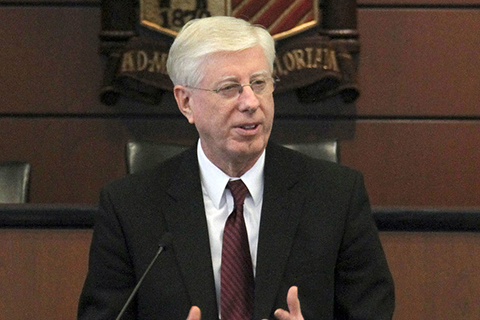DES MOINES — Iowa Attorney General Tom Miller called on legislators to pass bills to prevent fentanyl-related deaths.
“We know that many of the overdose deaths are accidental, often because people are unaware they’ve ingested a dose of fentanyl,” Miller said. “We have tools available that could reduce these deaths, but we must first change Iowa’s laws.”
In 2021, 258 Iowans died of opioid overdoses, an increase of 21% over 2020, according to preliminary data from the Iowa Department of Public Health. About 83% of those deaths involved fentanyl or other synthetic narcotics.
“The stories are tragic,” Miller said. “Iowans are being poisoned.” In January, Miller warned Iowans about the increase in overdoses connected to fentanyl.
Story County Sheriff Paul Fitzgerald, who serves as chairman of the Central Iowa Drug Task Force, has seen the dangers of fentanyl use in Iowa first-hand. His office and the drug task force have encountered 10 overdose cases, three of which were fatal. All three of the individuals who died were exposed to fentanyl.
“We at Story County Sheriff’s Office and the Central Iowa Drug Task Force strongly support the efforts of what you are doing,” Fitzgerald said during a press conference on Thursday. “This will save lives.”
Miller plans to propose the following bills that would:
Legalize fentanyl test strips. These are small strips of paper that can detect the presence of fentanyl in pills, powder, or injectables. Under Iowa Code 124.414, the strips are considered drug paraphernalia and are illegal.
Several states, including Wisconsin and Georgia, have recently decriminalized the test strips.
The Iowa Department of Public Safety and other agencies are seizing large amounts of pills that contain fentanyl. These counterfeit pills, known as M30s, resemble prescription opioids or other medication. Without test strips or other equipment, it is impossible to tell whether the pills contain fentanyl.
In addition, Iowa law enforcement agencies are detecting fentanyl in other drugs, including heroin, methamphetamine, and cocaine.
“Test strips are inexpensive and easy to use, and most important, they can save lives,” Miller said. “In public health, we know that harm reduction works.”
The American Medical Association and other health groups have supported legalizing the test strips as well as increasing naloxone access.
Increase access to naloxone. The drug, also known by the trademarked name Narcan, can reverse overdoses and prevent death. Use of naloxone has soared in Iowa: In fiscal year 2021, emergency medical services administered 3,106 doses, an increase of 50% from FY2018, according to the Iowa Department of Public Health.
Iowa pharmacists can dispense naloxone without a prescription to Iowans, and kits are free through a local community-based pharmacy or Iowa’s Tele-Naloxone program. Demand, however, has been relatively low, with about 3,000 kits distributed since July 2020. Healthcare providers say that Iowans may be unwilling to obtain naloxone through pharmacies because of fear and stigma.
Other states have allowed secondary distribution of naloxone, so that community groups can dispense the drug directly to the public. Iowa’s pharmacy rules, however, prohibit secondary distribution of prescribed medications.
Miller supports a bill allowing “entities in position to assist” — such as nonprofits, businesses, or other organizations — to apply to the state to receive a supply of naloxone to distribute to the public. These entities would not collect identifying information for the state’s prescription drug monitoring program.
Miller also plans to propose ideas to lawmakers on how they can use money from settlements his office has secured from major opioid manufacturers and distributors. The settlement funds must be used in ways to abate the opioid crisis, such as supporting prevention, treatment, and recovery.




